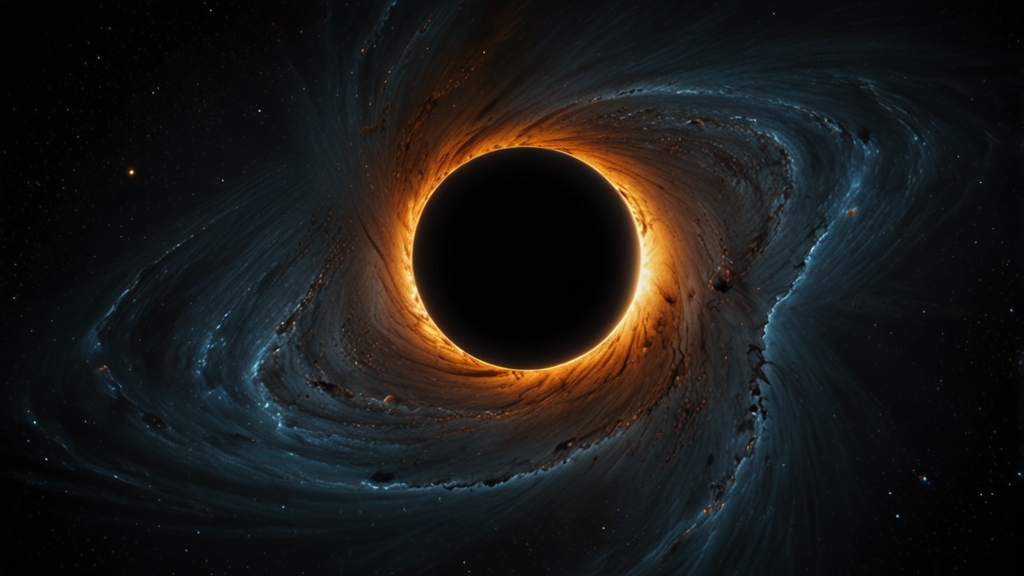The Phenomenon of Black Holes: Science's Greatest Enigmas
Black holes are among the most fascinating and mysterious objects in the universe. These regions of space-time are characterized by their extreme gravitational pull, a force so strong that nothing, not even light, can escape once it crosses the event horizon. This singular quality has made black holes a subject of intense study and speculation in both scientific and popular discourse.
“Black holes are where God divided by zero.” – Albert Einstein
What Exactly is a Black Hole?
A black hole is formed when a massive star reaches the end of its life cycle and its core collapses under the force of its own gravity. This collapse results in a singularity, an infinitely small point where the laws of physics as we know them cease to apply. Surrounding the singularity is the event horizon, the point of no return for any matter or radiation.
There are primarily three types of black holes: stellar, supermassive, and intermediate. Stellar black holes form from collapsing stars, while supermassive black holes, which are millions to billions of times more massive than the Sun, reside at the centers of most galaxies, including the Milky Way. Intermediate black holes, as the name suggests, fall between these two categories and are still a subject of ongoing research.
The Quest for Understanding
Understanding black holes has been a monumental challenge for scientists. Albert Einstein’s general theory of relatational predicted their existence, but even he found the concept difficult to accept. It wasn't until the latter half of the 20th century that black holes became an essential part of astronomy and astrophysics.
One of the biggest breakthroughs in black hole research came in 2019 when an international team of scientists used the Event Horizon Telescope to capture the first-ever image of a black hole's event horizon. This groundbreaking achievement has provided invaluable data that will not only help us understand black holes but will also test our current theories of gravity and space-time.
“The image of the black hole revealed to us for the first time what one looks like. It was like seeing the gates of hell and at the same time the heaven of physics.” – Heino Falcke, Astrophysicist
Black Holes and Their Mysteries
Despite these advancements, many mysteries remain. One such enigma is the information paradox, a puzzle that arises from the apparent contradiction between quantum mechanics and general relativity. According to quantum theory, information about a physical system should never be lost, but black holes appear to erase information entirely. Resolving this paradox is one of the great challenges facing modern theoretical physics.
Another intriguing aspect is the concept of "Hawking Radiation," proposed by Stephen Hawking. According to this theory, black holes can emit radiation due to quantum effects near the event horizon, leading them to lose mass and eventually evaporate. This hypothesis challenges the established understanding that nothing can escape a black hole's gravitational pull.
The Impact on Our Understanding of the Universe
Black holes serve as natural laboratories for testing the limits of our physical theories. They push the boundaries of our understanding, compelling us to rethink what we know about the fundamental nature of reality. Advances in technology and observational capabilities promise to reveal even more about these enigmatic objects in the years to come.
The study of black holes has implications far beyond the objects themselves. They have led to advancements in our understanding of gravitational waves, helping us unlock the secrets of how massive objects interact in space. They have also fueled speculation about the nature of dark matter and dark energy, two of the most perplexing components of the cosmos.
Conclusion
Black holes are among the most intriguing enigmas in all of science. As we continue to delve into their mysteries, we gain not only a deeper understanding of the universe but also new insights into the fundamental nature of reality. While they pose some of the most profound questions in physics, they also offer the promise of revelations that could forever alter our understanding of the cosmos.
“It is said that fact is sometimes stranger than fiction, and nowhere is that more true than in the case of black holes. They teach us that the universe is full of surprises and that there is still so much left to learn.” – Kip Thorne, Theoretical Physicist






